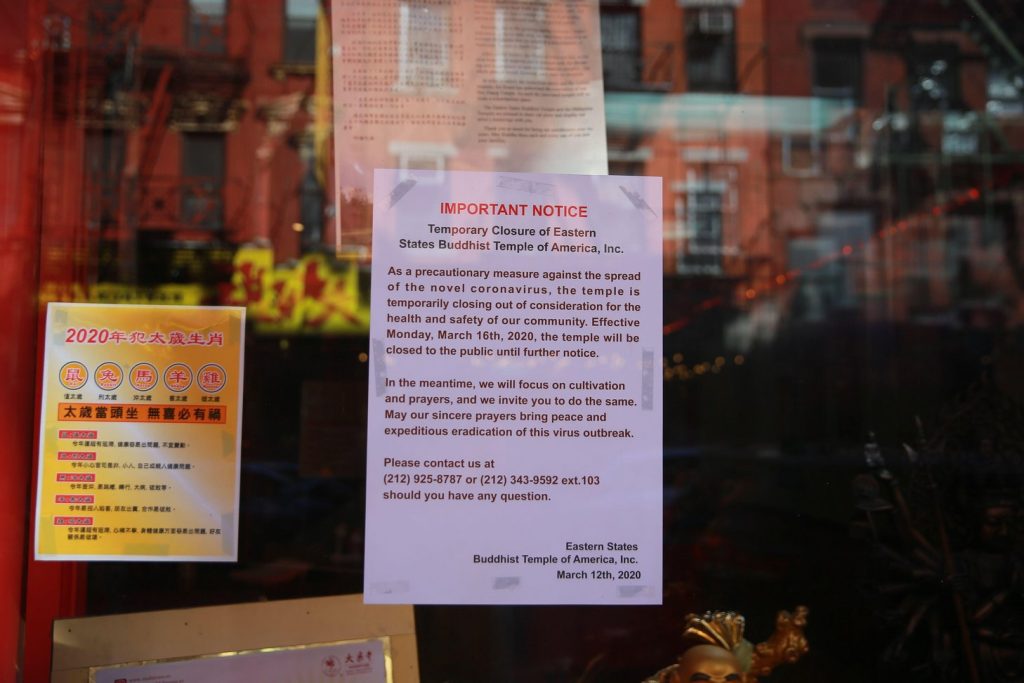Nothing is permanent, so everything is precious. Here’s a selection of some happenings—fleeting or otherwise—in the Buddhist world this week.
CDC Releases Pandemic Guidelines for Faith Communities
On May 22, the Centers for Disease Control and Prevention (CDC) released new guidelines for faith communities that choose to reopen during the coronavirus pandemic. The guidelines include instructions on hygiene practices, face coverings, disinfection, and social distancing. Although President Donald Trump last week deemed places of worship “essential” during the pandemic, CNN reported that faith leaders across the country have stressed the need for caution. Rev. Elizabeth Eaton, presiding bishop of the Evangelical Lutheran Church in America, told CNN that God “has given us the gift of science” and urged her congregations to abide by the CDC guidelines. “Protecting others is a faithful response,” she said.
Many Buddhist centers remain closed while continuing to offer online teachings and meditation sessions. (Tricycle’s live online meditation sessions will continue as well.) In an update explaining their decision to keep their doors shut, the Insight Meditation Society said, “The alleviation of unnecessary suffering is a way to honor our mission even when no one is sitting in our meditation halls.”
Japanese Temple Expands Wedding Ceremonies for Same-sex Couples
After the city of Kawagoe became Japan’s 48th local government to legally recognize LGBTQ partnerships through a “partnership oath system” on May 1, a local Buddhist temple expanded its wedding ceremonies to include services for same-sex couples. According to Yahoo News Japan, Saimyo-ji temple now offers weddings (photography and traditional outfits included) for 200,000 yen—about $1,858 USD. “With the increasing understanding of LGBTQ in society as a whole these days, we’re working on creating a new temple with people who are sexual minorities,” vice priest Akihiro Senda told Yahoo News Japan. He also said that the ceremonies will provide “rainbow malas” and rainbow-colored kesa [Buddhist vestments] for the couple to wear. While Saimyo-ji is not the first temple in Japan to provide same-sex wedding services, it may be the only Buddhist temple that offers these sartorial accompaniments.
今日は東京レインボープライド🏳️🌈オンラインパレードの日です🤗❗️
最明寺はLGBTQフレンドリーな寺院を目指しております🙏全てに平等な仏教を通じ、皆様と想いを共有していきたいですね。
来年こそは代々木公園のパレードに参加します🌈 写真は自慢のLGBT輪袈裟💕#川越 #TRP2020 #おうちでプライド pic.twitter.com/KRxOa1iV4z
— 千田明寛 (最明寺 副住職) (@saimyou_kun) April 26, 2020
Chinese Buddhists Use Online Merit Fields During Lockdown
Monasteries in China have been closed since January, but they have adopted novel digital methods to interact with followers during the COVID-19 outbreak. According to a recent report by the National University of Singapore, monastics are using online platforms to promote Buddhist teachings and practices. In late March, Putuo Monastery in China’s Guangdong region posted a guide to cultivating “online merit fields” (wangluo futian) on WeChat, a social media platform popular in the Chinese-speaking world. By scanning a QR code, practitioners can participate in virtual ritual acts, including preaching the dharma; printing scriptures; donating to the monastery; and making offerings, such as vegetarian meals, to Buddhist statues and ancestral tablets. While these online services are not new, they may be the only way for Buddhists to worship until the pandemic has passed. Despite the tentative return to normalcy for businesses in China, it is uncertain when religious institutions will be permitted to open their doors to the public again.
24-Hours of Namu-Myoho-Renge-Kyo
Nichiren Shu practitioners have organized a 24-hour chanting event on Facebook Live that will run from 8:00 a.m. on June 6 to 8:00 a.m. on June 7, Japan Standard Time. Information about the session can be found at the “24 Hours Odaimoku offering to heal the world” Facebook group, where the chanting will be broadcast live. (For more on the history and practice of Nichiren Buddhism and the chanting of the odaimoku, check out Myokei Caine-Barrett’s video Dharma Talks, “Living the Lotus Sutra.”)
Thank you for subscribing to Tricycle! As a nonprofit, we depend on readers like you to keep Buddhist teachings and practices widely available.
